From Dumb to Dangerous
Jef Costello, American Renaissance, February 24, 2023

Mark Bauerlein, The Dumbest Generation Grows Up: From Stupefied Youth to Dangerous Adults, Regnery Gateway, 310 pp., $19.79.
The Dumbest Generation Grows Up is Mark Bauerlein’s sequel to his bestselling 2009 book, The Dumbest Generation: How the Digital Age Stupefies Young Americans and Jeopardizes Our Future. Both books deal with Millennials, the generation usually defined as anyone born between 1981 and the mid-90s, and the author, who taught English at Emory University for many years, has had a good look at this generation. His first book was widely reviewed, with many critics commenting on its “dire predictions” for the future of Millennials. As its title implies, Prof. Bauerlein’s new book explores whether these predictions have been borne out. He argues that they have.
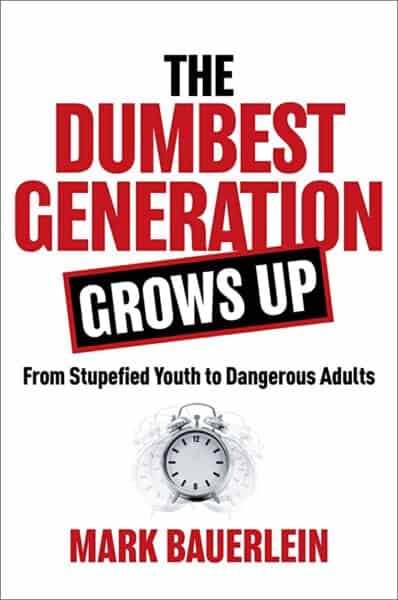
The conclusions of the earlier book can be summarized in a single quotation: “The Dumbest Generation will cease being dumb only when it regards adolescence as an inferior realm of petty strivings and adulthood as a realm of civic, historical, and cultural awareness that puts them in touch with perennial ideas and struggles.”
The conclusion of Prof. Bauerlein’s new book is that the dumbest generation has most certainly not grown up. But the volume is far from being one long “I told you so.” Prof. Bauerlein offers us fresh reflections on what has gone wrong with Millennials and how we might avoid making the same mistakes with future generations.
Needless to say, “what’s wrong with kids today?” is a perennial lament, and Prof. Bauerlein mentions that many have dismissed his concerns for precisely this reason. Especially among older generations, there is a strong desire to believe that our problems are nothing fundamentally new, that the doomsayers are taking it all far too seriously, and that everything will sort itself out. I saw this attitude in my own parents.
Admittedly, “we are doomed” is a bitter pill to swallow. But it is hard to come away from any sustained experience with Millennials without becoming a doomsayer.
Like Prof. Bauerlein, I recently retired from many years of university teaching, a good portion of which was spent trying to understand the problems of my students, who changed dramatically over the course of my 30-year career. Toward the end, I was teaching “Gen Z,” the generation after the Millennials — who, if anything, are worse.
My students combined ignorance with strident moral certainty (possibly the most striking thing about high-profile Millennials like Alexandria Ocasio-Cortez). They seemed to have had no general education at all, and lacked the most basic knowledge of history, even recent history. They were immature and emotionally fragile.

Alexandria Ocasio-Cortez. Credit: nrkbeta, CC BY-SA 2.0, via Wikimedia Commons
Many could not handle criticism, no matter how sugar coated. It took very little to reduce them to tears — or to send them into fits of narcissistic rage. They were shockingly bereft of intellectual curiosity, and many gave the impression of having no internal life at all.
It was difficult to get a class discussion going, because my students were often unwilling to make judgments of any kind. Partly, this was because they had an intense fear of offending anyone. But, in addition, they professed to believe that everything is “relative” and that it’s therefore wrong to judge (completely unaware of the fact that this itself is a judgment). They also saw no inconsistency in espousing relativism and then, in the next moment, denouncing their political opponents as “evil.”
In general, their moral reasoning was framed exactly in these sorts of black and white terms (an issue that is very important for Prof. Bauerlein, as we shall see). But in their own behavior they were often shockingly amoral. Many lied to me, and I caught large numbers of them cheating on assignments. They were always looking for shortcuts. Almost none did the assigned reading.
Many could not follow a simple chain of reasoning. Often it seemed that my class was the first occasion they had ever been challenged to think. It was common for them to visit me during my office hours and ask me to tell them exactly what I wanted them to say on tests or in papers. When I said that I wanted to see evidence that they had done their own thinking, they would look panic stricken.
A very sizeable percentage of students had a documented “learning disability” that I was required somehow to work around. Many of them had been diagnosed as somewhere on the autism spectrum. They often seemed disconnected from their bodies and from nature. In my last several years of teaching, more and more identified as transgender.
Most of my students seemed desperately unhappy and unfulfilled. I became convinced, and still am, that something had gone seriously wrong with these people. Yes, it’s true that the older generation has always complained about the younger, probably since human life began. But the Millennials and Gen Z seem to have problems that are unique — and uniquely bad. Bad for them, and bad for society’s future. If these are the people who will be in charge one day, it really is hard not to believe we are doomed.
Searching for some precedent, we might be tempted to liken our “woke” Millennials and Gen Z to the starry-eyed students radicals of the 1960s. But the similarities are only superficial. As Prof. Bauerlein points out, the children of the ’60s were protesting the Vietnam War and the draft — major issues, in other words. Students today are protesting “microaggressions.”
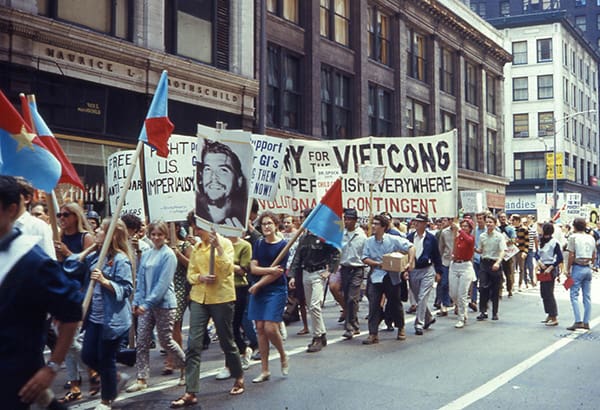
Anti-war demonstration as Chicago was preparing to host the Democratic National Convention, August 10, 1968. Credit: David Wilson, CC BY 2.0, via Wikimedia Commons.
And the radical youths of the 60s were far more literate than what passes for young radicals today. In the ’60s, when Robert Frost visited a university to read his poems, he would fill a stadium. Today, the students would attend only if required, and they would sit in the bleachers texting through the entire event.
Certainly, the youth of today are overwhelmingly liberal, just like their predecessors in the 60s. But this seems to be perennially true. As Winston Churchill supposedly said, “If you are not a liberal when you are young, you have no heart, and if you are not a conservative when old, you have no brain.” What is genuinely surprising, however, are the polls showing that more than a third of Millennials support communism.
One reason for this, of course, is ignorance of history. Most Millennials can give you an exact figure of how many people were murdered by the Nazis, but they have no idea that in the last century communist governments killed around 100 million of their own citizens. The other part of the problem, however, is that even the Millennials who support communism don’t even really know what it is.
When I confronted my leftie students with the figure of 100 million dead, they would usually respond, “But that wasn’t real communism!” It was a line some had picked up from professors. Each time someone said this in class, I asked the students to explain to me what “real communism” is. None could.
This is why Prof. Bauerlein is critical of conservatives who call these young people “socialists.” They don’t know enough to identify as socialists, or anything else. He points out that while his students have pledged to fight racism, most are unaware of the steps already taken by the courts and the legislature to end discrimination.
A friend of mine got a vivid sense of this when he decided to attend a BLM protest two and a half years ago in Atlanta, passing himself off as a fellow traveler. The young white protestors he spoke with said they were there because “nothing had been done” for blacks. When my friend gingerly asked them how they assessed such measures as affirmative action, most had no idea what he was talking about.
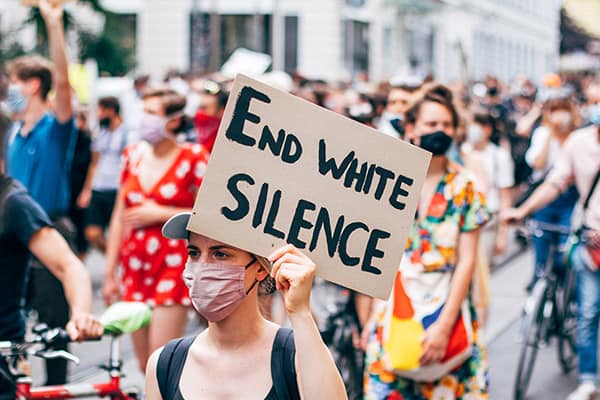
Black Lives Matter protest. Credit: Ivan Radic, CC BY 2.0, via Wikimedia Commons
How can you join in the “ongoing struggle” when you have no knowledge of the ground that’s already been won? It’s for reasons such as these that Prof. Bauerlein prefers to call the younger generation “utopians” rather than committed socialists. As he puts it:
What belief best suits a youth who doesn’t want to go to church? What conception of human nature will appeal most to someone who trusts in his own exceptional nature? What vision of the future works best for someone with no sense of the past? What standard of judgment goes with a sensibility that won’t distinguish superior from inferior creations? What ultimate meaning will he find on his own? The answer is: Utopia.
The Utopia today’s youth yearn for is one where everything will be “fair” and everyone will be “nice.” No one will want for anything, and no one will have to do anything he doesn’t want to do. Work (if there is any) will be “fun.” All the pseudo-problems (“systemic racism,” “climate change,” etc.) will, of course, have been solved. And, most importantly, all student loan debt will have been forgiven.
It is hard to believe that their views are this simplistic, but they are. I had to sympathize with Prof. Bauerlein’s descriptions of how he struggled mightily to find some depth in his students’ worldview. He recalls asking one young woman why students were so “triggered” by an impending campus visit by conservative pundit Milo Yiannopoulos. Drawing her words out for effect, she responded, “They believe that everyone . . . deserves . . . to be happy.” And she chose not to elaborate.
The problem with Milo is that he is sharp-tongued; his words hurt. That some of those words are true is simply not a relevant consideration. The Utopia of the Millennials and Gen Z will be one where no one’s feelings will be hurt, and thus no one will be made unhappy. Being thin-skinned and easily offended are the characteristics of the younger generation that are now most often noticed. Their views on freedom of speech are exactly what you would expect them to be.

Milo Yiannopoulos gives a speech at Trinity University in San Antonio, TX, on April 10, 2016. (Credit Image: © Michael Mullenix/ZUMA Wire)
Prof. Bauerlein cites a recent poll showing that 44 percent of students think that the First Amendment does not protect so-called “hate speech.” Sixteen percent said that they “don’t know,” making the solidly pro-free speech contingent a mere 40 percent. Fifty-one percent believe that protestors are justified in shouting down a speaker uttering “offensive and hurtful statements.” Nineteen percent believe it is justified to use violence against such a speaker.
While liberal journalists and academics had hailed Millennials some years ago as the most “tolerant” generation in history, they have shown themselves to be anything but. Prof. Bauerlein cites the authors of a survey from 2020 called the “American Worldview Inventory,” who drew the following conclusions: “Findings show Millennials — by their own admission — as far less tolerant than other generations. In addition, they are more likely to want to exact revenge when wronged, are less likely to keep a promise, and overall have less respect for others and for human life in general.”
So, where did it all go wrong? Or, to quote the very first sentence of the book, “What have we done to them?” Prof. Bauerlein asks us to look to the reading habits of Millennials. The 2010 American Times Use Survey (ATUS) showed them spending fully five hours and 40 minutes per day on “leisure and sports.” Most of this, however, was screentime.
Reading print (books, magazines, etc.) accounted for a mere seven minutes on weekdays and six minutes on weekends. A 2006 survey of high school students found that 43 percent reported spending “one hour or less” reading for classes each week. Twelve percent reported “zero” reading for class. Contrast this to the Gen Xers of 1987, 47 percent of whom spent at least six hours per week preparing for class.
Again and again, Prof. Bauerlein demonstrates a steady and disturbingly swift decline over the past 30 to 40 years. College readiness scores in reading dropped from 53 percent in 2009, to 45 percent just 10 years later. SAT reading scores show a similar decline. A 2004 survey showed that only 43 percent of 18-to-24-year-olds read any kind of serious literature in the preceding 12 months. In 1992 it was 53.3 percent. In 1982 it was 59.8 percent.
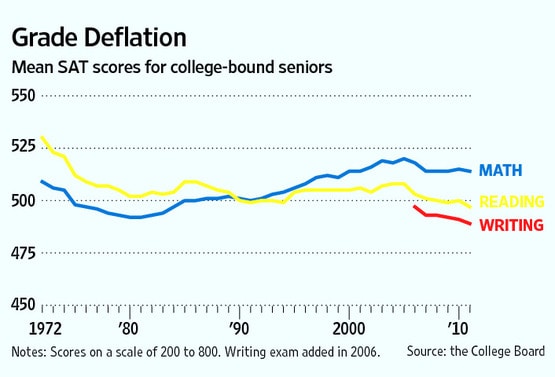
There are several reasons why it is possible for students to get away with not reading literature. The first is that teachers have lowered their standards. In response to their students’ resistance to reading, teachers have simply required less.
Racial diversity is, of course, another factor in this decline in standards. The average black student is at nowhere near the reading level of even the worst whites. Since our educational system, and our society as a whole, cannot admit the reality of racial differences, areas of study where the disparities are all too obvious must either be eliminated or relentlessly dumbed down. The result is that generations of promising white students have been deprived of an education in good literature, so as not to draw attention to black shortcomings. Unsurprisingly, Prof. Bauerlein is silent on this subject.
The decline of reading standards in our high schools has had a catastrophic impact on university education. Early in my teaching career I realized that when I gave lectures, I could not assume that the students had read the assignments. It was useless to impose such measures as reading quizzes, since there would have been rampant failure. My students had not been challenged to read difficult material in high school. As a result, most of them could not understand the reading on their own, even if they tried to plow through every page.
Finally, there is a pervasive relativism in academia today. It began in the universities and has now taken root in high school. Many academics refuse even to entertain the idea that there are essential pieces of literature that all students should read, especially when books by Dead White Males top the list. Those who do believe in the importance of the “Great Books” tend to keep silent, for fear of being branded as right-wing. It is impossible to overstate the cowardliness and conformism of university professors.
Prof. Bauerlein blames Millennials’ lack of exposure to good literature for most of their problems. This is his central thesis. The idea was suggested to him by a colleague, who was commiserating with Prof. Bauerlein one day about his students’ shortcomings. “They haven’t read enough literature,” the man said, matter-of-factly. Prof. Bauerlein was astonished by the simplicity of this explanation — and by the end of The Dumbest Generation Grows Up he wholly endorses it.
For Prof. Bauerlein, not reading good books explains why Millennials hold such simplistic and naïve views, why they are unable to make nuanced moral judgments, and why they lack empathy for people who hold differing opinions. The same colleague explained to him that “a good novel is good psychology.” Prof. Bauerlein writes:
He didn’t mean anything complicated by that remark, only that good novels land interesting characters in situations of conflict, and good authors give them psychological depth. The characters have motives, and you have to figure them out. Read the books, and you treat the characters as real people having actual thoughts and doing real things. I immediately agreed. His point was too commonsensical to dispute.
In other words, you learn a lot about life and other people from reading good literature. It helps you become a more astute observer of the human condition, teaches you to empathize with others, sometimes even with the villain of the piece, and this fosters intellectual and emotional maturity.
Prof. Bauerlein cites neuropsychological studies showing that fiction activates regions of the reader’s brain aligned with what the characters are doing or feeling. In other words, you literally do feel something of Priam’s grief for Hector. I don’t think we needed neuroscientists to tell us this, but it’s the sort of evidence that tends to impress modern people, especially Americans.
Thus, the reason Social Justice Warriors tried to assault Charles Murray back in 2017 was because they hadn’t read enough novels. I am not caricaturing Prof. Bauerlein; this is what he claims. He writes that the students “didn’t see [Murray] as an individual, a man with a history and an experience. No, they faced a racist, a depersonalized, undifferentiated embodiment of racism, a figure distinguished only by his fame and power.” For students immersed in real literature, this would not have been possible.
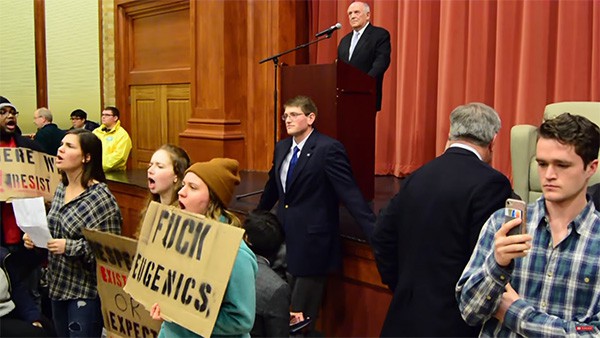
Charles Murray. Credit: YouTube screengrab.
While I myself have long preached the benefits of an education in the Great Books, I am not convinced that this is really the key to “what’s wrong with kids today.” The folks I spent time with a few summers ago in rural West Virginia haven’t read any literature either — yet they possessed the one priceless trait that seems to be lacking in so many Millennials: simple human decency.
The reason they possessed it was because they had led real lives — lives that were sometimes difficult. They had to grow up fast. There was no coddling; the tough-minded people who raised them had no patience with whining and excuses. They had to do without a great deal that other modern children take for granted. And, most importantly, their lives required them to spend most of their time in the real world interacting directly with other human beings and learning how to get along with them.
Millennials, by contrast, have spent much of their lives staring at screens, interacting with virtual friends who can always be kept at a distance. They have imbibed toxic quantities of propaganda and advertising, all of it presenting a sometimes radically false view of life and human nature. The people I met in West Virginia have seen too much real life to find “wokeness” plausible.
“They haven’t read enough literature” is much too facile an explanation of what is wrong with Millennials. But it’s exactly the sort of theory that one would expect of an emeritus professor of English — a man who has spent decades on college campuses reading books. That’s a nobler way of life than spending one’s days looking at TikTok, but it is just as removed from the real world.
Near the beginning of The Dumbest Generation Grows Up, Prof. Bauerlein offers us a few tidbits that could form an alternative (or complementary) explanation of what is wrong with Millennials. He mentions these, but then drops them — perhaps because they are just too depressing. For example, he quotes a New York Times article according to which parents working for the tech industry “increasingly panic over the impact screens have on their children and [are moving] toward screen-free lifestyles.” The reporter goes on to note that executives in Silicon Valley are now sending their children to “vigilantly low tech” schools, such as Waldorf schools.
In other words, they are worried about their own products damaging the developing brains of their children. Prof. Bauerlein also quotes Chris Anderson, former editor of Wired and head of a robotics firm: “We thought we could control it. And this is beyond our power to control. This is going straight to the pleasure centers of the developing brain. This is beyond our capacity as regular parents to understand.”
Anderson goes on to compare tech to crack cocaine, and Prof. Bauerlein responds with a line from the occasionally sagacious Bill Maher: “The tycoons of social media have to stop pretending that they are friendly nerd-gods building a better world and admit they’re just tobacco farmers in T-shirts selling an addictive product to children.”
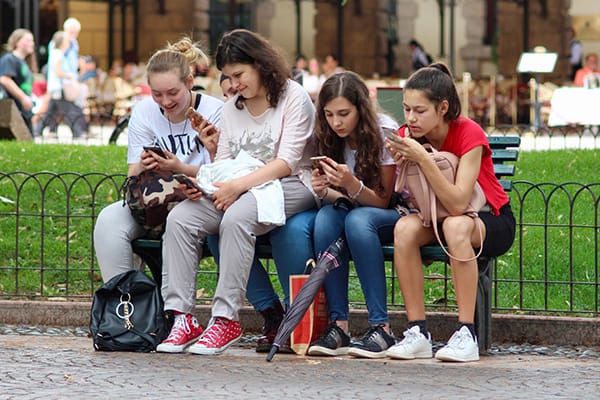
Credit: GHCassel, CC0, via Wikimedia Commons
It’s not clear that the damage screentime is doing to young minds is reversible. Some of my own students, despite my best efforts, seemed to be broken. Let’s hope it is reversible, for technology now seems to be breeding generations of people programmed to be shallow, unfeeling, tyrannical narcissists. The internet has been an enormous gift, especially to those of us on the Dissident Right. But as Paracelsus said, “All things are poison, and nothing is without poison; the dosage alone makes it so a thing is not a poison.”
It is dangerous to try to attribute a complex phenomenon to one single cause or condition. Prof. Mark Bauerlein is certainly correct when he argues that Millennials would have benefitted by greater exposure to good books. I am afraid, however, that the real roots of their problems may be much more sinister and much harder to fix.















